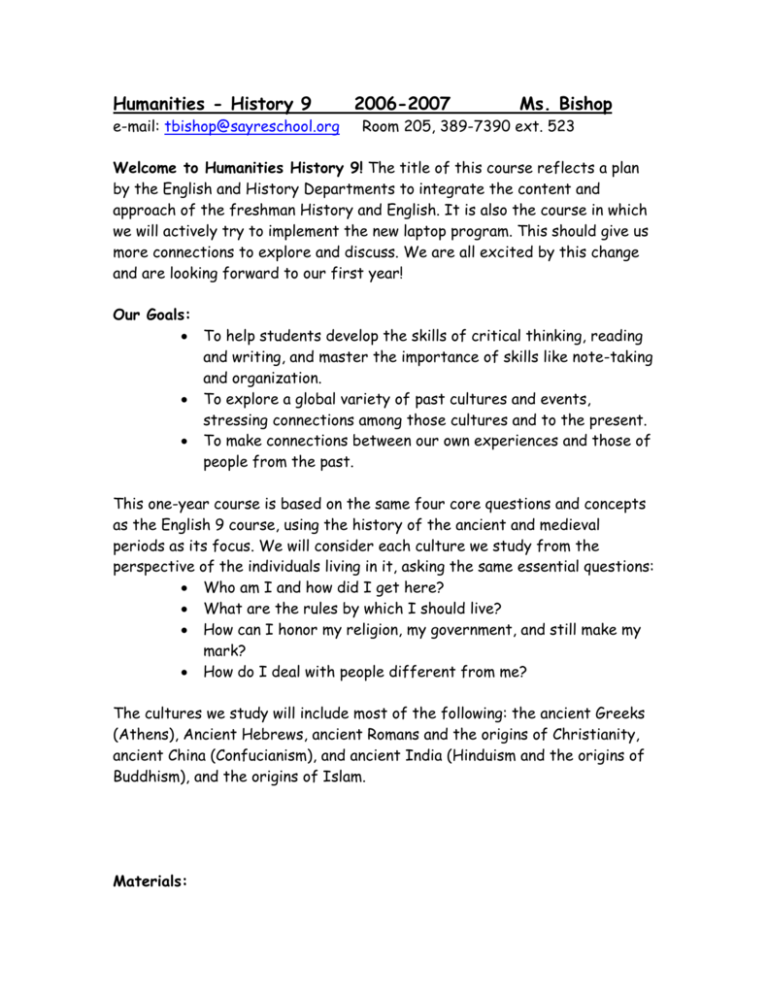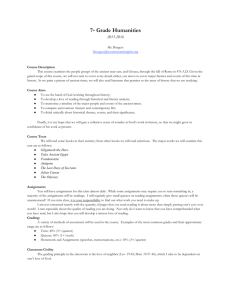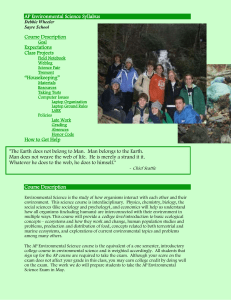Humanities - History 9 2006-2007 Ms. Bishop
advertisement

Humanities - History 9 e-mail: tbishop@sayreschool.org 2006-2007 Ms. Bishop Room 205, 389-7390 ext. 523 Welcome to Humanities History 9! The title of this course reflects a plan by the English and History Departments to integrate the content and approach of the freshman History and English. It is also the course in which we will actively try to implement the new laptop program. This should give us more connections to explore and discuss. We are all excited by this change and are looking forward to our first year! Our Goals: To help students develop the skills of critical thinking, reading and writing, and master the importance of skills like note-taking and organization. To explore a global variety of past cultures and events, stressing connections among those cultures and to the present. To make connections between our own experiences and those of people from the past. This one-year course is based on the same four core questions and concepts as the English 9 course, using the history of the ancient and medieval periods as its focus. We will consider each culture we study from the perspective of the individuals living in it, asking the same essential questions: Who am I and how did I get here? What are the rules by which I should live? How can I honor my religion, my government, and still make my mark? How do I deal with people different from me? The cultures we study will include most of the following: the ancient Greeks (Athens), Ancient Hebrews, ancient Romans and the origins of Christianity, ancient China (Confucianism), and ancient India (Hinduism and the origins of Buddhism), and the origins of Islam. Materials: Though we will be stressing the use of laptop computers in this class, we will still need to keep track of papers. For this reason, ach student is required to have a large loose-leaf binder devoted completely to History. This binder should have plenty of loose-leaf paper and dividers for reading notes, class notes, homework assignments, handouts and all returned quizzes, tests, and writing assignments. Each student is responsible for keeping track of these materials (you will need them for the final exam). I will occasionally check binders for their organization and content. - Students are expected to bring their binders, their laptop computers and whatever book they used for the day’s homework to class every day unless otherwise notified. Classroom participation: Daily preparation for and participation in class challenges our minds, promotes analytical thinking and reminds us that history can be a lot of fun when we participate in its continuation together. Classroom participation and effort are extremely important and make up as much as 20% of a student’s term grade. Attendance and Note-taking: You can’t participate if you’re not in class! Class discussions and textbook reading are not interchangeable, for we often make wonderful and interesting connections in class that no textbook can duplicate. Attendance and note-taking (on paper or in your laptop) are essential to getting the most out of this material and this class. Laptop Organization: Laptops usually help us to be more organized, but you need to start out with a system. On your laptop, typically under “My Documents” or on your desktop, you should create a folder titled “History.” Within that main folder, should be subfolders, which we will name at a later date. Honor Code and Plagiarism: Plagiarism is anything you copy word for word or paraphrase closely without attributing it to the author. This can be a sentence or phrase from the internet, a paragraph from a sibling’s paper, or anything that is not your own work. Do not be tempted by plagiarizing for the easy out – it’s not difficult for teachers to spot writing that is different from what you previously handed in, nor is it hard for us to trace your source on the internet. Plagiarism is a violation of the Sayre honor Code and plagiarism cases are handled by the Sayre Honor Council. Ultimately, getting in the habit of not doing your own work has dire ramifications far beyond your years at Sayre. Refer to your student handbook for more immediate consequences of plagiarism. Homework: Homework usually consists of a 20-25 minute reading assignment, with a related written or interactive computer component, often reading notes. Research projects, web-based activities, oral presentations, creative writing assignments and essays will also be assigned as homework. Larger assignments will be assigned in advance, and may very well overlap with nightly reading and note-taking. Students will be expected to balance these short-term and longer-term assignments and complete both punctually. Homework will be announced in class daily. It will also posted on PCR Educator and on my teacher website. Please note that dates posted are the dates that the assignment is due in class. When you need to refresh your memory about what your homework is, please check PCR Educator first; it will have your assignments for all of your classes. Daily reading assignments are usually posted for several days in advance, while short written assignments (reflections, thinking/writing questions) might be added at the close of a class in addition to the reading. Students are responsible for checking for their assignments daily and making note of all assignments and changes. If you miss class, check the website and call/e-mail a friend for notes. ”My internet connection was down” and “I didn’t know what the homework was” are not valid excuses when all freshmen have telephones, laptops and school e-mail accounts. Format for written work and submission of work: All work handed in will be formatted in the following way: Times New Roman 12 point font double spaced one inch margins stapled Your name at the top of the document! Make sure you try to print before class – it’s strange how printer problems seem to occur more frequently closer to deadlines! Late work will be penalized. If the assignment has already been discussed in class, the assignment will only be accepted for 50% of its original point value. Laptop Ground Rules: Gaming: Games should not be played at anytime in my classroom - not before, during, or after class or during any ‘down’ time. Excessive gaming can cause your laptop to fail and uses a tremendous amount of resources, both on your computer and in some cases the network. Misuse of the laptop for gaming (or any other off task behavior) can result in removal of laptop privileges in my room - temporarily or permanently. NO Instant messaging Task Bar/Dock: I should be able to see your taskbar/dock at ALL times when I stop by your computer. Please do not set it to disappear and reappear. Internet use should be limited to academic purposes, specifically only what is needed for this class. To clarify this point, keep in mind that some activities are completely off-limits: shopping, surfing for music, looking up sport scores, gambling, and peer-to-peer games. You are responsible for maintaining your laptop in good working order. If you have a problem, see Ms. Turner or Ms. Goodman immediately. Recording – If you want to record my class, you must have my permission BEFOREHAND. Overall Grading: Written homework See above description and explanation. Class participation and effort are noted on a daily basis and can account for as much as 20% of the term grade. Tests, quizzes, writing assignments, creative projects and oral reports, together with homework, make up the bulk of the term grade. In addition to homework, we will have approximately one graded assignment weekly and a test or project about every two weeks. Final exams are given in December and May on the entire semester’s material. These make up 20% of the student’s semester grade. Term grades are computed as follows: Participation, effort, note-taking 20% Quizzes and homework, tests, essays, projects 80% Semester grades are computed as follows: Term1 grade Term 2 grade Cumulative final exam 40% 40% 20% Terms 3 and 4 are calculated in the same way as Terms 1 and 2. Let’s have some fun this year! TB








